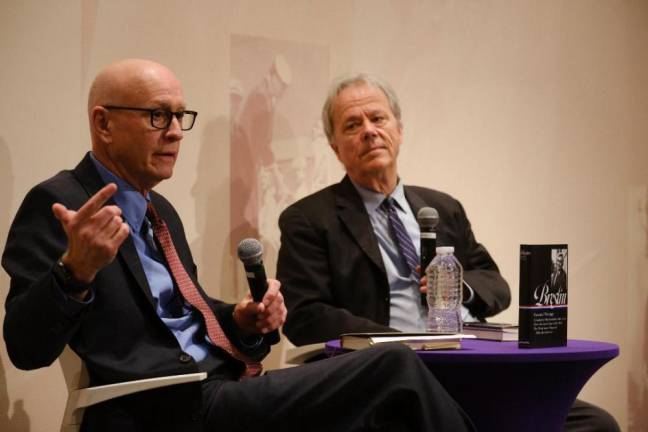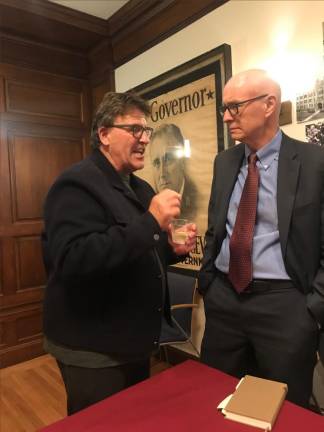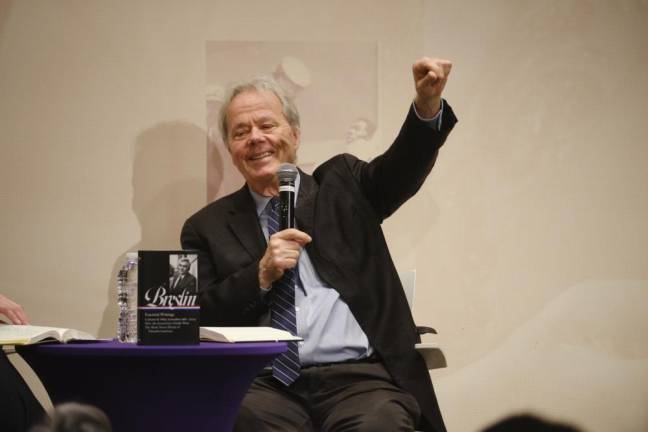Newspaper Men Dan Barry and Michael Daly Speak About the Legendary Jimmy Breslin
New York Times columnist Dan Barry said it took him nearly a year to cull six decades of newspaper work from Jimmy Breslin into the book “Breslin: Essential Writings.” Barry and Michael Daly, veteran city side reporter, recently spoke about the enduring influence of the deadline legend at a sold out Hunter College lecture.



“So what do we talk about?” Michael Daly asked, laughing and somewhat quietly like someone who has so much to say, he doesn’t know where to begin. He held up the book. “I think this is a very important book.” He sighed. “It actually is essential.”
The newly published Breslin: Essential Writings was celebrated at the Roosevelt House Jack Newfield lecture series at the Public Policy Institute at Hunter College. I could have stayed at home and watched the event on zoom. But that’s not my style. And certainly not Breslin’s. When you report on something, you gotta get out there. A lot of journalists work from home these days, browse the screen, copy, paste and paraphrase. Not Jimmy Breslin. But he didn’t really consider himself a journalist.
“Reporter. Not a journalist,” Breslin said in the HBO documentary, Breslin and Hamill: Deadline Artists (2019), when he was asked how he defines himself as a journalist. “I don’t know what those words mean. That’s a college word. You just go out and report, you work chase news. That’s the key word, chase, chase, chase. And in the chasing you always run into something.”
And I chased uptown to see what I’d run into. The room was packed. The overflow upstairs, where the lecture was also being televised, was also packed. Jimmy Breslin, who died in 2017, was still, as he liked to say, “J.B. No. 1-the greatest columnist in the history of the world.” Breslin never finished college. He won a Pulitzer Prize anyway, in 1986 for commentary.
Born and raised in Jamaica, Queens, he started out as a copy boy for the Long Island Press in the late 1940s. But he got fired after he left his clothes on a radiator to dry and after some late night carousing and dozed off, wrapped in a blanket, which unfortunately fell to the ground bright and early the next morning when he was awoken from a slumber by a mother dropping off her daughter’s engagement announcement. “And that is how I got fired from the Long Island Press,” Breslin concluded in a column he wrote for the News when the Press folded in 1977. Undeterred by the early set back, he went to work for other papers and worked his way up to being a sportswriter for the New York Journal American and landed a bestseller with his book about the New York Mets Can’t Anybody Here Play This Game? (1963). That led to writing columns for the New York Herald Tribune, New York magazine the Daily News, and Newsday.
“He covered nearly every big crisis, outrage and scandal afflicting New York in his newspaper years, from the 1964 Harlem race riot to the tragedy of 9/11,” The Washington Post wrote in his obituary. He also reported from Vietnam, and Belfast and had John Gotti’s phone number. He published 16 books, seven of them novels, plus two anthologies of his columns.
It took New York Times writer Dan Barry almost a year to choose the columns he compiled in his Library of America edition Breslin: Essential Writings.
The room was filled to the brim with legendary journalists, or truth tellers, as Ann Kirschner, president of Hunter College, defined both Breslin and Jack Newfield, in whose honor the lecture series was being held. In her opening remarks, she quoted Newfield’s journalistic credo, “the point is not to confuse objectivity with truth.”
On the stage, Barry was joined by Michael Daly, another truth teller, and lifelong friend of Breslin’s, who worked alongside him at The Daily News.
“Even if you read everything he wrote as he was writing it,” Daly said. “It’s really important to do it now, and there is one line in one of his columns, where he talks about when the past becomes important. And I think that’s where we are now in history. The past is important, because we have to look back for some guidance as to how the fuck did we get here.”
Daly turned to the page, where Breslin wrote about Donald Trump in 1990. “And he talks about how Donald’s secret was that he would return phone calls to reporters.” The column is titled Trump: The Master of the Steal.
“The guy is a witness to history,” Barry listed some of the many historic moments Breslin witnessed, the assassination of Malcom X, the march in Selma, the Vietnam war, the assassination of Bobby Kennedy, and one of his most famous columns where he interviewed the grave digger who was digging the grave for the slain president John F. Kennedy in 1963. “His sense for history is always there.”
“The difference between then and now. That is my question to you.” Michael Meyers, president and founder of the New York Civil Rights Coalition, asked when the microphone was handed to the audience for questions. “When Jimmy Breslin was writing, there were all kinds of newspapers. And there were many and they were cheap. And people read, people were seemingly more literate than they are today... So given the shortness of columns now... 600 words... I don’t know how Jimmy Breslin could write today... What organ would he have other than the New Yorker?”
Daly paused. “He would have finally succumbed and gone to the Times,” he looked at Barry, who writes for the Times. “He used to always read The New York Times, just so he could say, it’s unreadable.”
But Meyer’s question had hit a nerve. Where would Breslin be today, how would he confront our confused and convoluted reality? Someone else asked about the migrants, “Where would he be today with that?” Daly didn’t hesitate, Breslin would be at the Floyd Bennett Field migrant shelter in Brooklyn, he said, or at the Roosevelt Hotel, he would have been at the busses, he would have spoken to the people in Rockaway that are complaining about the migrants, and to a woman selling candy on the train, a woman who walks thousands of miles from Guatemala so she can sell candy on a subway with her kid on her back.
Upstairs at the reception, I got online to get my book signed by Barry. I had brought my own copy, thankfully, because by the time I got to the table the books were all sold out. And then I heard a funny voice, a thick Queens accent, a man with a joy filled belly much like Breslin had in his heyday. It was one of his sons, Kevin Breslin. He wanted to know who I was writing for. Chelsea News NY, I told him. “Local, Local, local!” His father would have approved and he sat down with me.
I felt like I was talking to Breslin himself, his son had that same kind of energy, a kind hearted and fast-paced energy. And he started talking to me. He saw my pen and my reporter pad, and he knew right away I was looking for a story, so he gave me one.
“I had a job,” Kevin began telling me, “when I was a kid and my father worked at the Daily News. I was on the trucks delivering the paper. I did the South Bronx run. The late shift. When the truck went out at night from 41st street, I’d be on the truck with the newspaper bundles. And I’d throw them at the candy stores, at the bodegas.“ With his father’s column inside.
“And I used to get annoyed when the driver would go too fast. When the bundles would explode, open up, I’d get pissed off. I’d yell at the driver, stop the truck. I’d wanna jump out and pick up the bundles, because the wire snapped on the papers. The driver didn’t care. He was part of the driver’s union. I cared because I knew what my father slaved like to go and get that story. It was way more than just some newspaper thing. It was our family’s enterprise. It was his work. It was what put food on our table. And I know how hard it was to go out, like you, with the reporter pad and pen, snoop around and listen, and then get something and go home and write it. I remember, I used to be pissed at the driver.”
Breslin worked for himself, his son wanted to make sure, I understood that. Even when he worked for the Daily News, or anyone else, he wrote for himself. He wrote “for permanence, in perpetuity.”